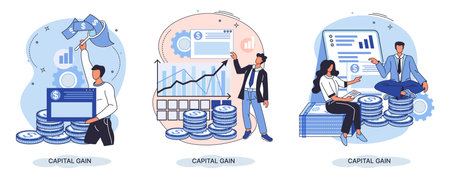1. Introduction to Oracle Networks
Decentralized Finance (DeFi) has revolutionized the way financial services operate, removing intermediaries and allowing for direct peer-to-peer transactions. However, blockchain networks, including those powering DeFi applications, face a fundamental limitation: they cannot directly access external data. This is where oracle networks come into play.
What Are Oracle Networks?
Oracle networks serve as bridges between blockchains and real-world data sources. They fetch, verify, and transmit off-chain data to on-chain smart contracts, enabling them to interact with external information securely and reliably.
Why Are Oracle Networks Important in Blockchain Ecosystems?
Oracle networks play a critical role in expanding the functionality of blockchain technology, especially in DeFi applications. Without oracles, smart contracts would be limited to using only on-chain data, severely restricting their practical use cases.
(1) Enabling Smart Contracts to Access Real-World Data
Smart contracts require accurate price feeds, weather conditions, sports results, and other real-world data to execute correctly. Oracle networks provide this essential information.
(2) Reducing Centralization Risks
Without decentralized oracles, blockchain projects might rely on single points of failure for external data sources. Decentralized oracle networks distribute the responsibility across multiple nodes, enhancing security and reliability.
(3) Supporting a Wide Range of DeFi Applications
Many DeFi protocols depend on real-time price feeds and other external data to function properly. Oracle networks enable lending platforms, derivatives trading, stablecoins, and more.
How Oracle Networks Work
Oracle networks follow a structured process to ensure the accuracy and security of the data they provide:
| Step | Description |
|---|---|
| (1) Data Request | A smart contract requests specific off-chain data. |
| (2) Data Retrieval | The oracle network fetches the requested data from various sources. |
| (3) Data Verification | The network verifies the accuracy of the collected data using consensus mechanisms. |
| (4) Data Transmission | The verified data is sent back to the smart contract for execution. |
| (5) Smart Contract Execution | The smart contract processes the received data and executes accordingly. |
Conclusion
2. Why DeFi Needs Oracles
Decentralized finance (DeFi) operates on blockchain technology, which is inherently isolated from the external world. While this ensures security and transparency, it also creates a major limitation—blockchains cannot directly access real-world data such as asset prices, weather conditions, or sports results. This is where oracles come in.
How Oracles Bridge On-Chain and Off-Chain Data
Oracles act as intermediaries that fetch, verify, and transmit real-world data to smart contracts on the blockchain. Without them, DeFi applications would be unable to interact with essential market data needed for lending platforms, stablecoins, derivatives trading, and more.
(1) The Problem of Blockchain Isolation
Blockchains are designed to be self-contained environments. While this enhances security, it prevents them from accessing external data sources on their own. This isolation makes it impossible for DeFi protocols to function effectively without an external data input mechanism.
(2) Real-Time Data for Smart Contracts
Smart contracts execute automatically based on predefined conditions. However, they require accurate and timely off-chain data to function correctly. For example:
| DeFi Use Case | Required Off-Chain Data |
|---|---|
| Lending Platforms | Real-time asset prices for collateral valuation |
| Stablecoins | Fiat currency exchange rates |
| Derivatives & Options Trading | Market price feeds for contract settlements |
| Insurance Protocols | Weather or event-triggered data |
(3) Preventing Manipulation and Ensuring Reliability
If DeFi protocols were to rely on a single data source, they could be vulnerable to manipulation or inaccuracies. Oracles mitigate this risk by aggregating data from multiple sources and using cryptographic proofs to ensure accuracy.
(1) Decentralized Oracles vs. Centralized Oracles
A key distinction in oracle networks is whether they operate in a decentralized or centralized manner:
| Oracle Type | Characteristics |
|---|---|
| Decentralized Oracles | Use multiple data sources and consensus mechanisms to ensure accuracy and prevent manipulation. |
| Centralized Oracles | Rely on a single entity for data delivery, making them a potential point of failure. |
(2) The Role of Oracle Networks in DeFi Security
By decentralizing data retrieval and verification processes, oracle networks enhance the security and reliability of DeFi applications. They ensure that smart contracts receive accurate and tamper-proof information, reducing risks such as price manipulation attacks.
The Growing Importance of Oracle Networks in DeFi
The reliance on oracles will only grow as DeFi expands into new markets and use cases. With more sophisticated financial products emerging, the need for secure, transparent, and reliable data sources becomes even more critical.

3. Types of Oracle Networks
Oracle networks come in different structures, each with its own advantages and trade-offs. The three main types are centralized, decentralized, and hybrid models. Understanding these different oracle types is crucial for evaluating their role in DeFi.
Centralized Oracles
A centralized oracle is controlled by a single entity or organization. It gathers data from external sources and feeds it into smart contracts.
Advantages of Centralized Oracles
- Faster response times due to a single data provider
- Lower operational costs compared to decentralized alternatives
- Simpler implementation for developers
Disadvantages of Centralized Oracles
- Single point of failure, making them vulnerable to attacks
- Higher risk of data manipulation or inaccuracies
- Reduced trustlessness, which contradicts DeFi principles
Decentralized Oracles
Decentralized oracles rely on multiple data sources and validators to provide information. These oracles distribute trust across various participants rather than depending on a single entity.
Advantages of Decentralized Oracles
- Greater security by eliminating a single point of failure
- More reliable and tamper-resistant data aggregation
- Aligned with the trustless nature of DeFi applications
Disadvantages of Decentralized Oracles
- Higher costs due to multiple verifiers and validators
- Slower transaction speeds compared to centralized models
- Increased complexity in setup and maintenance
Hybrid Oracles
A hybrid oracle model combines elements of both centralized and decentralized systems. This approach seeks to balance efficiency, security, and reliability.
Advantages of Hybrid Oracles
- Improved security compared to fully centralized models
- Faster transaction processing than fully decentralized solutions
- Greater flexibility for specific use cases
Disadvantages of Hybrid Oracles
- Still partially reliant on central entities, introducing some risks
- Complexity in managing both centralized and decentralized components
- Potentially higher costs due to maintaining dual structures
Comparison of Oracle Types
| Oracle Type | Main Strengths | Main Weaknesses |
|---|---|---|
| Centralized Oracle |
|
|
| Decentralized Oracle |
|
|
| Hybrid Oracle |
|
|
The choice between these oracle models depends on the specific needs of a DeFi project. While centralized oracles offer efficiency, decentralized ones provide greater security. Hybrid models aim to combine the best aspects of both approaches.
4. Security and Reliability Challenges
Oracle networks play a crucial role in DeFi by providing external data to smart contracts. However, they also introduce security and reliability challenges that must be addressed to maintain trust and stability in decentralized finance.
Potential Risks in Oracle Networks
Despite their importance, oracle networks face several risks that could compromise the integrity of DeFi applications. Here are some of the key challenges:
(1) Price Manipulation
Since DeFi platforms rely on oracles for asset pricing, malicious actors can attempt to manipulate these prices for financial gain. This can lead to artificial price swings, allowing attackers to exploit arbitrage opportunities at the expense of honest users.
(2) Single Points of Failure
If an oracle network is centralized or relies on a limited number of data sources, it becomes vulnerable to single points of failure. A malfunction or attack on a central entity can disrupt the entire system, leading to incorrect data being fed into smart contracts.
(3) Data Latency Issues
Oracles must deliver real-time data efficiently. However, delays in fetching and transmitting information can cause discrepancies between on-chain and off-chain data, potentially leading to losses for traders and liquidity providers.
How Decentralized Oracles Mitigate These Threats
Decentralized oracle networks help address these risks by implementing mechanisms that enhance security and reliability. The table below highlights how decentralized oracles counteract common threats:
| Threat | How Decentralized Oracles Mitigate It |
|---|---|
| Price Manipulation | Aggregating data from multiple independent sources reduces the risk of price manipulation by ensuring no single provider has complete control over reported prices. |
| Single Points of Failure | A distributed network of nodes prevents reliance on any single entity, ensuring continuity even if some nodes fail or are compromised. |
| Data Latency Issues | Optimized data-fetching mechanisms and frequent updates ensure that price feeds remain accurate and up-to-date with minimal delays. |
The Importance of Continuous Improvements
The landscape of DeFi is constantly evolving, making it essential for oracle networks to adapt and improve their security measures. Ongoing research, advancements in cryptographic techniques, and greater decentralization will further strengthen these systems against emerging threats.
5. Future of Oracle Networks in DeFi
As the DeFi ecosystem continues to evolve, oracle networks are also undergoing significant advancements. These innovations aim to improve security, scalability, and efficiency, ensuring that decentralized applications can access reliable and real-time data. Below, we explore some key developments shaping the future of oracle technology.
1. Enhanced Security Mechanisms
Security remains a top priority for oracle networks as they serve as critical bridges between on-chain and off-chain data. Innovations in this area include:
- Decentralized Validation: Using multiple independent nodes to verify data before it is sent on-chain.
- Zero-Knowledge Proofs (ZKP): Enhancing privacy and security by allowing verification without revealing sensitive information.
- Threshold Signatures: Distributing trust among multiple parties to prevent single points of failure.
2. Scalability Improvements
As DeFi adoption grows, oracle networks must scale efficiently to meet increasing demand. Some solutions being developed include:
- Layer 2 Integration: Leveraging rollups and sidechains to reduce congestion on main blockchains.
- Optimistic Oracles: Utilizing dispute-based mechanisms to deliver faster and more cost-effective data feeds.
- Cross-Chain Compatibility: Enabling seamless data flow across different blockchain ecosystems.
3. AI-Powered Data Processing
The integration of artificial intelligence (AI) into oracle networks has the potential to enhance accuracy and reliability. AI-driven oracles can:
- Detect anomalies in price feeds and prevent manipulation.
- Optimize data sourcing by selecting the most credible providers.
- Automate dispute resolution through predictive analytics.
4. Expansion Beyond Financial Data
While oracles have primarily focused on financial data, their applications are expanding into other industries such as supply chain management, insurance, and gaming. This expansion enables smart contracts to interact with real-world events more effectively.
Use Cases for Expanding Oracle Networks
| Industry | Application |
|---|---|
| Supply Chain | Tracking goods and verifying authenticity using IoT devices. |
| Insurance | Automating claims based on real-time weather or health data. |
| Gaming | Providing verifiable randomness for fair in-game rewards. |
5. Long-Term Impact on DeFi Ecosystem
The continuous evolution of oracle networks will shape the future of DeFi by improving reliability, reducing costs, and enabling new financial products. As these innovations mature, DeFi platforms will become more resilient, scalable, and capable of serving a broader audience globally.
(1) Greater Trust and Adoption
With stronger security measures and improved accuracy, users will feel more confident in relying on decentralized finance solutions powered by robust oracle networks.
(2) More Complex Smart Contracts
Advanced oracles will allow developers to create highly sophisticated smart contracts that go beyond simple transactions, unlocking new possibilities in decentralized applications.
(3) Interoperability Across Blockchains
The ability to seamlessly transfer data between different blockchain ecosystems will foster greater collaboration and innovation across the crypto space.
The future of oracle networks in DeFi is bright, with continuous improvements leading to a more efficient and secure decentralized financial system. As these technologies evolve, they will play an even greater role in shaping the next generation of blockchain applications.


